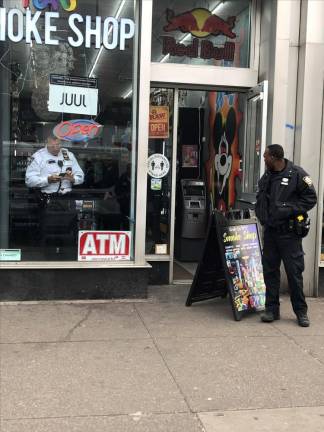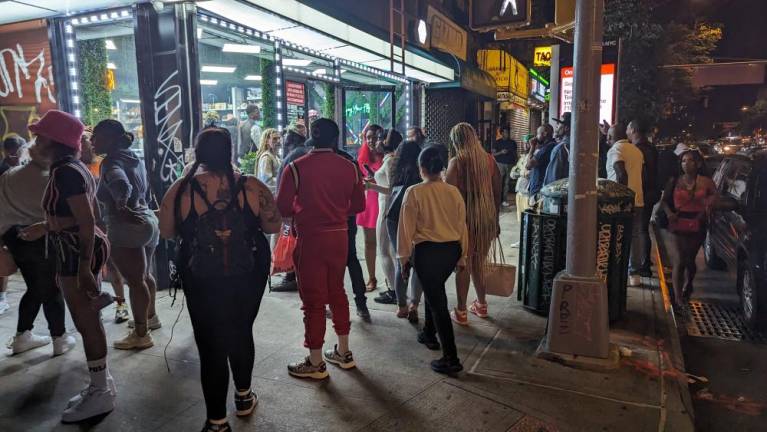NYC Councilmembers Push For A Bill To Padlock Unlicensed Weed Shops
A new bill to expedite the closure of unlicensed smoke shops has been introduced to the city council. The bill will add a new category to the nuisance abatement law, making it easier for the City to close down illegal shops and impose new penalties if caught selling weed to anyone under age 21.


The latest in the ongoing conflict between the state and unlicensed marijuana business owners is the City Council’s proposal to weed out and padlock unlicensed stores across the Big Apple. In an announcement made on X (formerly Twitter) on November 1, on the eve of the City elections, NYC Councilman Keith Powers stated, “Tomorrow, I’m introducing a new bill to close down the illegal pot stores in New York City. It’s one of the top complaints we receive every day, and we’re taking action.”
The bill, if passed, would empower law enforcement authorities to shut down hordes of unlicensed weed stores and take action against illicit cannabis sales under the city’s nuisance abatement law. It would also create a new category banning stores from selling cannabis to anyone under the age of 21.
City officials say there are currently about 1,500 illegal marijuana shops and only 11 legal ones in the five boroughs following the legalization of cannabis in the state in 2021. Five of the licensed shops are in Manhattan. One lawyer who has represented unlicensed shops thinks the city is way undercounting the unlicensed shops and thinks the real number of unlicensed shops across the five boroughs is closer to 8,000.
The rollout of legal shops has been slow compared to other states and enforcement against unlicensed shops has been sporadic. Up until now, it has fallen to the City Sheriff's Office to patrol the illegal shops. But even when the sheriffs raid a shop and confiscate the goods, the shop is often resupplied and back in business within days. The new bill may make it easier to take enforcement actions to shut down the shops selling illegal cannabis and padlock the stores.
“If the cops or somebody else walks in and they find that they’re actually selling illegal products, they will for the first time have the ability to close that business down and padlock it,” Powers said in an interview with CBS News.
According to Powers, who was also a strong supporter of the state legalization process under ex-Mayor Bill de Blasio, allowing illegal weed stores to conduct business puts everyone at risk–from those who are waiting to receive their licenses and create jobs for the city to residents buying from these businesses. With little to no knowledge about where the cannabis is sourced from, illicit sales put everyone’s health at risk.
Councilmembers Eric Bottcher, Gale Brewer, Julie Menin, and Chris Marte of Manhattan have also supported the bill, signing on as co-sponsors along with Oswald Feliz of The Bronx and Lynn Schulman of Queens. In an Instagram post, Eric Bottcher shared that “unlicensed pot shops undermine the licensed recreational cannabis market and pay no taxes, depriving BIPOC communities of promised community reinvestment funds. It’s also unfair to the licensed retail shops, which are struggling. The products sold in unlawful stores are unregulated, posing health risks to consumers. Meanwhile, more and more teens are purchasing cannabis products from unlicensed stores, often before and after school. The state must also issue vastly more legal licenses and do it now.”
Earlier this year, Gov. Kathy Hochul approved a new law that’s given the state Office of Cannabis Management and the Tax Department more authority to crack down on and close illegal pot shops around the city, with fines ranging up to $20,000 a day. In addition to this, the city also approved a law that allows the NYPD to go after landlords who rent spaces to illegal weed or tobacco sellers. If caught, these landlords could face an initial fine of $5,000 and then $10,000 on every subsequent inspection.
Since the state first legalized cannabis sale, the slow and long-drawn rollout of licenses means that only 26 licensed cannabis shops have opened statewide—just 11 in New York City. This slow pace has allowed illicit peddlers to take advantage of the decrimalization and establish their businesses, which mainly trade in cash and don’t pay taxes, to run without a proper license.
Since marijuana has not been decriminalized at the federal level, it means that patrons have to use cash or debit cards, but can’t use bank issued credit cards for purchases. That means the illegal pot stores have more cash on hand than most legal retail establishments, and that plus their late night hours of operation is a draw for criminals, law enforcement officials told Straus News. On top of that, illegal weed seized in a robbery can be re-sold on the street at below market value, undercutting the legitimate smoke shops.
Powers is hopeful that once passed, this bill would help regulate the illegal stores around the city and significantly reduce the problems affecting several neighborhoods in New York.